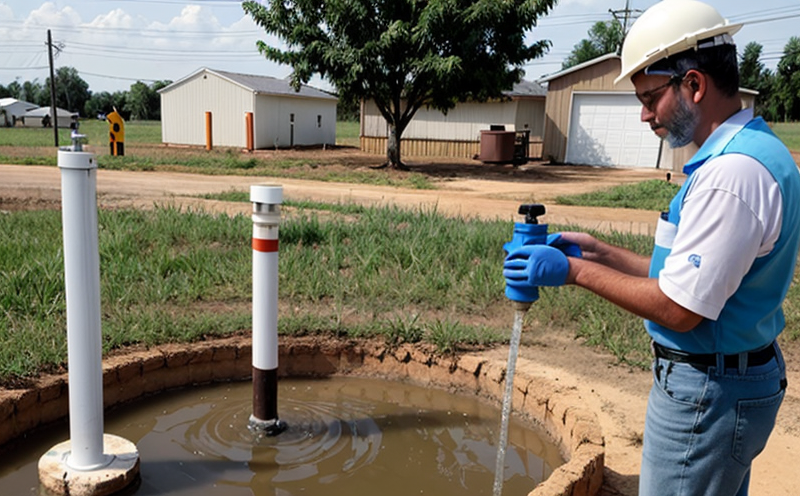EN ISO 16265 Perchlorate Testing in Groundwater
The testing of perchlorate in groundwater is a critical component of environmental monitoring and compliance with international standards. The ISO EN ISO 16265-1:2013 method provides robust guidelines for the determination of perchlorate in water samples. This standard is widely recognized and used by environmental agencies, laboratories, and industry professionals to ensure accurate and consistent results.
The process involves several key steps that are essential for reliable analysis:
- Sample Collection: Properly collecting groundwater samples is critical as it can significantly impact the accuracy of analytical results. Samples should be collected in airtight containers to prevent contamination from air and ensure they represent the true composition of the groundwater.
- Sample Preservation: Following collection, immediate preservation with nitric acid or another suitable reagent is necessary to stabilize perchlorate concentrations and prevent degradation.
- Sample Transport: Samples must be transported under controlled conditions to avoid further contamination. Proper refrigeration can help maintain the integrity of the sample until it reaches the laboratory for analysis.
- Preparation: Prior to analysis, samples are typically filtered and diluted if necessary to ensure they fall within the linear range of the analytical method.
- Analytical Methodology: The standard specifies a specific ion chromatography technique that is used to detect perchlorate. This involves conditioning the column with appropriate mobile phases followed by injection of the sample for separation and detection using UV/visible spectrometry or other suitable detection techniques.
- Quality Assurance: Quality assurance measures, including calibration checks, reagent blanks, method validation, and proficiency testing, are integral to ensuring the accuracy and precision of results. Regularly performing these steps helps maintain compliance with international standards and regulatory requirements.
- Reporting: Results are reported according to the ISO standard format, providing detailed information on sample identification, analytical methodology used, concentrations determined, and any relevant method-specific parameters.
The importance of this testing cannot be overstated. Groundwater is a vital resource that supports ecosystems, agriculture, drinking water supplies, and industrial processes. Contamination by perchlorate can have severe environmental impacts, including harming plant life and affecting aquatic organisms. By adhering to the EN ISO 16265-1:2013 standard, laboratories can ensure they are providing reliable data that helps protect these resources.
Our laboratory has extensive experience in performing this testing with state-of-the-art equipment and trained personnel who understand the nuances of sample handling and analysis. This ensures we deliver accurate, consistent results every time, helping our clients make informed decisions regarding groundwater quality management.
Eurolab Advantages
At Eurolab, we pride ourselves on offering comprehensive services that go beyond mere compliance with standards like EN ISO 16265-1:2013. Our advantages include:
- Expertise and Experience: Our team of chemists and environmental scientists has extensive experience in ground water quality testing, ensuring accurate results.
- State-of-the-Art Facilities: Equipped with the latest instrumentation and technology, our laboratory provides reliable and repeatable results.
- Dedicated Client Support: Our dedicated client support team offers assistance from sample collection to final report delivery.
- Comprehensive Reporting: Beyond just numbers, we provide detailed reports that include method validation data, calibration curves, and other relevant information for your review.
- Continuous Quality Improvement: We are committed to improving our processes through ongoing training and adherence to best practices.
- Rapid Turnaround Times: Our efficient procedures allow us to deliver results quickly without compromising accuracy or precision.
- Certified Personnel: All personnel involved in testing are certified according to international standards, ensuring their expertise aligns with the highest industry benchmarks.
With Eurolab, you can trust that your groundwater quality data will be accurate, reliable, and compliant with all relevant regulations. This allows you to make informed decisions about water resource management, contamination prevention, and compliance strategies.
Customer Impact and Satisfaction
The importance of accurate perchlorate testing in groundwater cannot be overstated, as it directly impacts environmental health and water resource management. By partnering with Eurolab, our customers enjoy several benefits:
- Informed Decision Making: Reliable data allows for informed decision-making regarding water quality management.
- Regulatory Compliance: Ensuring compliance with international standards helps avoid fines and penalties associated with non-compliance.
- Environmental Protection: Detecting and addressing perchlorate contamination prevents potential harm to ecosystems and public health.
- Cost Efficiency: Early detection of problems can prevent costly remediation efforts later on.
- Credibility and Reputation: Demonstrating adherence to high-quality standards enhances a company's reputation among stakeholders and the public.
- Risk Mitigation: Identifying risks early helps in implementing preventive measures, reducing long-term liabilities.
Customer satisfaction is paramount at Eurolab. We consistently strive to provide accurate, reliable data that supports our clients' environmental stewardship goals and regulatory compliance. Positive feedback from satisfied customers underscores the value of our services in the water and wastewater testing sector.
Use Cases and Application Examples
The use cases for perchlorate testing in groundwater are diverse and critical to various sectors:
- Agriculture: Ensuring irrigation water does not contain harmful levels of perchlorate.
- Drinking Water Supply: Protecting public health by monitoring perchlorate in drinking water sources.
- Industrial Processes: Detecting perchlorate contamination from industrial sites and processes.
- Environmental Monitoring: Supporting long-term environmental studies to track changes in groundwater quality over time.
- Municipal Water Systems: Ensuring compliance with local, national, and international regulations regarding water quality standards.
- Potable Water Analysis: Identifying potential contamination sources that could affect potable water supplies.
- Groundwater Quality Management: Implementing effective management strategies to protect groundwater resources from contamination by perchlorate.
In conclusion, the EN ISO 16265-1:2013 standard for perchlorate testing in groundwater is a cornerstone of environmental quality assurance. Eurolab's expertise and commitment to excellence ensure that we provide accurate, reliable data that supports our clients' needs across various sectors.





